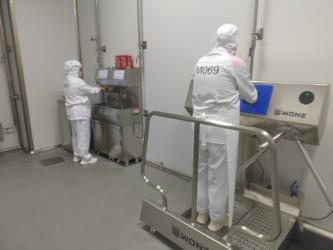Unite for Universal Hand Hygiene
 Introduction:
Introduction:
In the midst of the ongoing global pandemic, maintaining good hand hygiene has become more important than ever before. A key aspect of preventing the spread of infectious diseases lies in frequent and effective hand washing. To address this need, the concept of automatic hand washing stations has emerged as a valuable solution. In this article, we will explore the role of automatic hand washing stations in promoting universal hand hygiene, highlighting their benefits, features, and potential impact on public health.
The Importance of Universal Hand Hygiene:
Hand hygiene is a fundamental component of preventing the transmission of pathogens. According to the World Health Organization (WHO), proper hand hygiene can reduce the risk of respiratory infections by up to 23%. Since respiratory viruses like COVID-19 are primarily spread through droplets from an infected person's nose or mouth, washing hands regularly with soap and water or using hand sanitizers has been proven effective in reducing their transmission.
Challenges in Achieving Universal Hand Hygiene:
While the importance of hand hygiene is widely recognized, achieving universal compliance poses numerous challenges. Some of the major barriers include lack of access to clean water, unavailable or inadequate hand hygiene facilities, and inadequate awareness regarding the importance of hand hygiene practices. These challenges are particularly prevalent in schools, healthcare facilities, public spaces, and densely populated areas.
 Automatic Hand Washing Stations: A Game Changer:
Automatic Hand Washing Stations: A Game Changer:
Automatic hand washing stations offer a promising solution to overcome the challenges of achieving universal hand hygiene. These stations are designed to provide a touchless handwashing experience, thereby reducing the risk of cross-contamination. Equipped with sensors and advanced technology, they dispense an appropriate amount of water and soap automatically, ensuring thorough cleaning of hands without the need for physical contact.
Benefits and Features of Automatic Hand Washing Stations:
1. Touchless operation: By eliminating the need for touching surfaces, automatic hand washing stations minimize the risk of germ transmission and increase overall hygiene standards.
2. Water and soap efficiency: These stations are designed to dispense the optimal amount of water and soap required, minimizing waste and promoting sustainable use of resources.
3. Accessibility: Automatic hand washing stations can be installed in various locations, including schools, hospitals, shopping centers, airports, and public restrooms, ensuring access to hand hygiene facilities for all individuals.
4. Encouraging compliance: The innovative design and user-friendly interface of automatic hand washing stations can attract users, encouraging regular handwashing practices and thereby increasing hand hygiene compliance rates.
5. Real-time data collection: Some models of automatic hand washing stations are equipped with sensors that collect data on usage patterns. This data can prove beneficial for monitoring hand hygiene compliance rates, identifying areas of improvement, and optimizing resource allocation.
 Impact on Public Health:
Impact on Public Health:
The installation of automatic hand washing stations in public spaces and high-risk areas can have a substantial impact on public health. By providing easy access to hand hygiene facilities, these stations contribute to reducing the risk of infectious disease transmission. Additionally, their presence can serve as a reminder for individuals to practice good hand hygiene, thereby fostering a culture of cleanliness and contributing to a healthier society.
Unite for Universal Hand Hygiene:
To achieve universal hand hygiene, a collective effort is required. Governments, international organizations, healthcare facilities, and individuals must unite to promote and facilitate access to hand hygiene facilities. Policymakers should prioritize investing in the installation of automatic hand washing stations in areas where hand hygiene practices are most crucial. Public awareness campaigns and educational programs should highlight the importance of hand hygiene and emphasize the role of automatic hand washing stations as essential tools in the fight against infectious diseases.
Conclusion:
Universal hand hygiene is a vital aspect of preventing the transmission of infectious diseases. Automatic hand washing stations offer an innovative and effective solution to overcome the barriers hindering universal hand hygiene. These stations provide touchless handwashing experiences, ensuring proper hygiene practices and minimizing the risk of germ transmission. By promoting the installation and use of automatic hand washing stations, we can come together and unite for universal hand hygiene, fostering healthier communities for generations to come.


